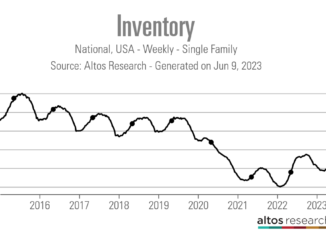
Despite stalling home sales in the third quarter, Anywhere Real Estate managed to deliver “considerable profitability.” The company closed the third quarter with $1.6 billion in revenue, which is 12% lower than Q3 2022, but $129 million in net income, an increase of 135% compared to the same time last year.
“Anywhere led through a difficult housing market to deliver considerable profitability and achieve substantial debt reduction,” Ryan Schneider, Anywhere president and CEO said in a statement. “We accelerated our strategic progress, including expanding our high-margin franchise business, integrating the consumer transaction experience, taking advantage of the better competitive environment, and putting significant litigation behind us, to set Anywhere up for powerful momentum as the housing market improves.”
The company produced these results as home sale transaction volume dropped 13% over last year. Existing home sales fell steadily throughout the summer, with home sales trending for the year at 4.07 million in July, 4.04 million in August, and 3.96 million in September.
Meanwhile, home prices remain higher than last year but moderated throughout the summer. In July, the median sales price was $405,700, sliding down to $404,100 in August and $394,300 in September. However, that price is still 2.8% higher than in September 2022.
This quarter’s results are in part due to the company’s cost-saving strategy. Just in Q3, Anywhere saved approximately $60 million and over $160 million year-to-date. The projected number for the full year is $200 million.
The company also reported reducing its debt by $281 million thanks to “successful debt exchanges, open market bond repurchases and repayment of a portion of their revolver balance.”
During the earnings call on Tuesday morning, Ryan Schneider said the company continues to invest in its luxury franchise power, launching in 10 key markets this year across the Northeast, the West and internationally. He also added that Anywhere was integrating its support services across brokerage and title to digitally assist agents and consumers from “contract-to-close.” According to Schneider, this initiative provides agents with “a high value transaction coordination service,” while offering consumers a “simpler transaction experience.”
“It’s a win for Anywhere as this makes it easier for us to capture title, mortgage and insurance economics and allows us to aggressively simplify, standardize and automate our operations,” Schneider said during the call.
During the third quarter, transaction sides at the firm’s franchise group, Anywhere Brands, dropped 18% year over year to 200,619. The firm’s owned brokerage group, Anywhere Advisors, recorded a 17% annual decline in transaction sides to 71,794.
Both Anywhere Brands and Anywhere Advisors reported a 5% increase in their average home sale price, inching up to $470,818 and $712,232.
During the earnings call, Charlotte Simonelli, Anywhere’s CFO, said the company expected transaction volumes to decline about 15-20% year over year. She identified the weak market coupled with high mortgage rates as the main culprits for the low transaction volume in 2023.
The agent commission split came in at 80,2% in Q3, a 56-basis points increase year over year, Simonelli said during the call. That number is in line with the splits seen in Q1 and Q2 of 2023. Simonellia said she liked to see this “moderation” in agents’ splits, which is driven by “lower volume, more stable agent mix, better recruiting economics and other proactive actions the company has taken.” She also noted that the company posted lower splits for its luxury agents.
Another hot topic on the call Tuesday morning was the Sitzer/Burnett trial, which is currently unfolding in Kansas City. Anywhere reached a settlement agreement in that class action antitrust lawsuit, along with a separate lawsuit, in September.
“We are pleased to have reached a nationwide settlement in the seller’s antitrust class litigation. While the settlement still needs court approval, this enables us to move past the distraction, uncertainty and expenses that come with complex and protracted litigation,” Schneider said during the company’s earnings call.



